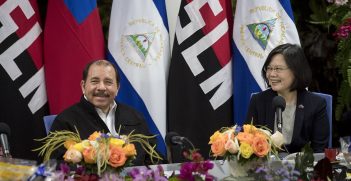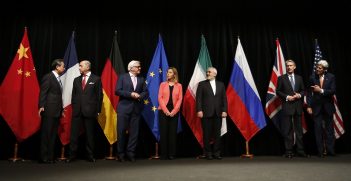Australia’s new Seoulmate? Security Cooperation between Australia and South Korea

To what extent should South Korea and Australia cooperate with the US in expanding US-led bilateral and mini-lateral security mechanisms in the Asia-Pacific region?
In contrast to the operation of a hub-and-spokes system during the Cold War, the US has been strengthening ties between its alliances in the post-Cold War period. A prime example is the Trilateral Strategic Dialogue (TSD) between the US, Japan and Australia. The TSD has been creating closer links between the US-Japan and US-Australia alliances, deepening the security relationship between Australia and Japan.
In Northeast Asia, the US has also attempted to connect the US-Japan and the US-South Korea alliances, so that these two spoke states can create a more comprehensive alliance relationship. However, such attempts have not been successful mainly due to the historical animosity between these two countries.
As these cases attest, the US has been stepping up its efforts to facilitate mini-lateralism (a gathering of the smallest number of countries necessary to make a major change on a particular issue), despite the fact that China perceives the US-led alliance network as a strategy to contain it. China asserts that this strategy is an outmoded relic from the Cold War.
Despite Chinese criticism, the US has been attempting to expand the aforementioned TSD to a quad-lateral security dialogue (QSD) including India. In the past, the idea of a Quad initiated by the US and Japan had been dismissed by Australia. Australia has distanced itself from any suggestion of ‘ganging up’ on China, because of Australia’s strong economic relationship with this power.
However, the idea of a Quad has the potential to be revived. First, Australia has cooperated closely with the US to allow the deployment of US military assets on Australian soil, including the rotation of US marines and airmen in Darwin and the Northern Territory. Second, India has been expanding its military exercises with the US. Third, India and Japan held two summit meetings last year, announcing that they will regularise their bilateral naval military exercises. Fourth, Prime Minister Modi visited Australia in November 2014 – the first visit by an Indian prime minister to Australia in 28 years. Last but not least, the spatial discourse regarding the Indo-Pacific has gained popularity in Australia, India, the US and Japan, a term that can be utilised as geographical grounds for the QSD.
Security cooperation between South Korea and Australia is also on the rise. The two states have been holding various high level defence and security talks, including their first 2+2 talks between defence and foreign ministers in 2013.
This functions alongside increased security cooperation between Australia and Japan, resulting from US efforts to link the US-Japan and the US-Australia alliance in the context of the TSD. To note, a Visiting Forces Agreement (VFA) between Japan and Australia has been under negotiation since July 2014. If signed, it would make it easier for Japan, Australia and the US to conduct military exercises in Japan. Australia participated in joint military exercises held in Japan in November 2014 – Australia’s first military exercise in the country (though Australia sent only a small number of soldiers, the VFA having not yet been signed).
Successful Japan-Australia security cooperation and South Korea-Australia security cooperation could imply the possibility an intensified Japan-Australia-South Korea security cooperation or a US-South Korea-Australia security cooperation sometime in the future. At Summits between South Korean President Park and Australian Prime Minister Abbott in April and November 2014, the leaders confirmed the importance of trilateral security cooperation between Australia, South Korea and the US. Further, there has already been trilateral and quadrilateral security cooperation between the US, South Korea, Japan and Australia responding to non-traditional security issues and under the framework of the Proliferation Security Initiative (PSI).
All that said, there are a number of issues to consider in promoting South Korea-Australia security cooperation within the context of trilateral or quadrilateral security cooperation in the region. First, there has been the (false) impression that Australia is tilting towards Chinese encirclement. Such an impression derives from the fact that Australia has been cooperating with the US deployment of military assets on Australian soil. Australia has been exerting efforts to mitigate Chinese concerns, inviting China to join the Kowari military exercises with the US held in October 2014. However, given that China perceives links between US-led alliances as encirclement, what would be the most strategic way to determine the appropriate level of South Korean and Australian participation in US-led mini-lateral gatherings? Could security cooperation between South Korea and Australia extend to the level of conducting bilateral military exercises?
The second issue is that some South Koreans suspect that Australia has been (or will be) tilting more towards Japan’s security posture than that of South Korea’s. Such suspicions began to emerge when Prime Minister Abbott described Abe’s Japan as “Australia’s best friend in Asia”, upsetting both South Koreans and the Chinese. Some South Koreans claimed that Australia has been backing the remilitarisation of Japan under the guise of encouraging normal statehood. How can Australia and South Korea work towards alleviating some of South Korea’s concerns that Australia been (or will be) tilting more towards Japan’s security interests than towards South Korea’s.
Third, what could induce Australia to expand security cooperation with South Korea? Should the list include intense cooperation in the area of defence industry, analogous to Japan and Australia’s joint development of an Australian submarine? What are the areas for practical security cooperation between Australia and South Korea?
These three issues should be properly addressed in order to facilitate practical security cooperation between Australia and South Korea. The second set of 2+2 meetings to be held in Canberra this year should provide an opportunity for the ministers to engage in serious discussions about these issues.
Jae Jeok Park is Assistant Professor at Hankuk University of Foreign Studies, South Korea.
This is an edited version of Park’s presentation at the Korea Foundation (KF) and Australian Institute for International Affairs (AIIA) Dialogue held in Brisbane, 29 December 2014. This article can be republished with attribution under a Creative Commons Licence.





